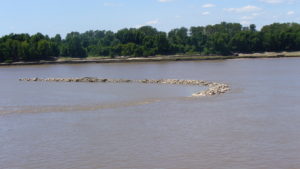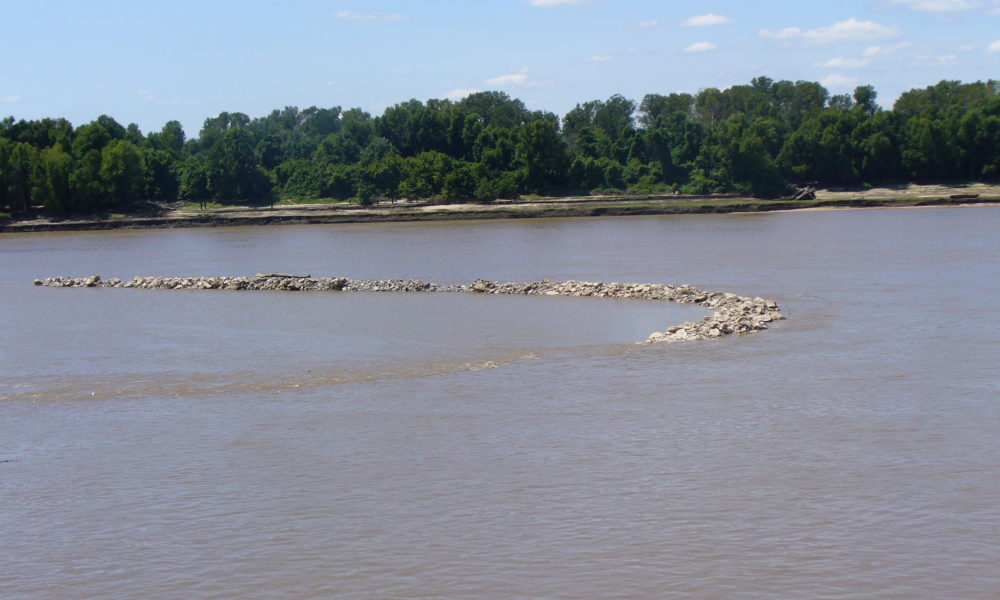Corps’ Plan Increases Flood Risks and Damages Habitat; Analysis of Impacts Insufficient
ST. LOUIS (May 13, 2020) – Five conservation groups have sued the  U.S Army Corps of Engineers, arguing the agency did not properly evaluate the impacts of its plan for managing a 195-mile section of the Mississippi River between St. Louis, MO and Cairo, Ill. The lawsuit was brought by the National Wildlife Federation, American Rivers, Prairie Rivers Network, Missouri Coalition for the Environment, and Great Rivers Habitat Alliance.
U.S Army Corps of Engineers, arguing the agency did not properly evaluate the impacts of its plan for managing a 195-mile section of the Mississippi River between St. Louis, MO and Cairo, Ill. The lawsuit was brought by the National Wildlife Federation, American Rivers, Prairie Rivers Network, Missouri Coalition for the Environment, and Great Rivers Habitat Alliance.
“The Army Corps has opted to continue to recklessly follow a century-old plan that increases the risk of catastrophic floods while destroying vital wildlife habitat,” said Melissa Samet, Senior Water Resources Counsel at the National Wildlife Federation. “It is unfortunate that we had to go to court to urge the agency to assess all the risks and evaluate modern approaches. However, last year’s flooding shows how critical it is that the Army Corps get this right.”
The lawsuit, filed in the U.S. District Court for the Southern District of Illinois, challenges the Corps’ Supplemental Environmental Impact Statement for the Regulating Works Project. The Regulating Works Project guides the Army Corps’ management of this section of the Mississippi River.
“Great Rivers Habitat Alliance is a part of this important lawsuit because we feel it is imperative that all government agencies properly consider the cumulative impacts of their individual project proposals, which far too many government entities at every level fail to do,” David Stokes, the executive director of the Great Rivers Habitat Alliance. “We also support limits on structural projects to attempt to manage our great rivers.”
The Army Corps has already constructed hundreds of miles of “river training structures” that alter the river’s flow. These structures – which include wing dikes, bendway weirs, and chevrons – have increased flood height by up to 15 feet in some locations and 6 to 8 feet in broad stretches of the Middle Mississippi. The impacts of these and other Army Corps actions on the river have so constricted the river that it now suffers from the type of flash flooding more typical of a much smaller river.
“The Army Corps should be protecting communities along the river, not putting them at even greater risk by building more structures that are known to increase flood heights,” said Kim Knowles, attorney and policy specialist for Prairie Rivers Network.
The plaintiffs argue the agency failed to properly evaluate the risk of increased flooding from the additional river training structures and it did not adequately consider the impacts of altering the river on fish, birds and other wildlife. The Army Corps’ analysis also ignored mitigation requirements passed by Congress in the 2007 water resources bill.
“American Rivers named the Upper Mississippi as America’s Most Endangered River for 2020 because of the urgent threat of flooding and climate change. The Army Corps’ outdated approaches threaten community safety and river health. It’s critical that the Corps reevaluate the impacts of its plan and consider more effective solutions. It is time to change course,” said Olivia Dorothy, Upper Mississippi Basin Director for American Rivers.
The Department of the Interior has documented 193 species of migratory birds in or around the project area. Some 144 species of fish live in this section of the river, including the endangered pallid sturgeon which is directly affected by the project.
“The Mississippi River is our region’s greatest natural asset. Decades of short-term thinking have deprived communities up and down the river of its natural, free-flowing benefits and risked lives, property, and environmental health by contributing to the severity of its floods,” said Heather Navarro, executive director of the Missouri Coalition for the Environment. “The people deserve a comprehensive review of the environmental impacts of the Corps’ decisions because we are all dependent on it. Decisions have been historically based on what’s good for certain businesses but the law calls us to do better.”
This lawsuit seeks to require the Corps to redo its environmental review, stop or limit construction of new river training structures, and effectively mitigate the impacts of its Regulating Works Project. The groups are represented by the Law Offices of Stephan C. Volker and Great Rivers Environmental Law Center.
Contact:
National Wildlife Federation: Lacey McCormick, 512-610-7765, mccormick@nwf.org
American Rivers: Amy Kober, 503-708-1145, akober@americanrivers.org
Missouri Coalition for the Environment: Heather Navarro, Executive Director, 314-632-6458, hnavarro@moenviron.org
More information: NWF Factsheet on River Training Structures

